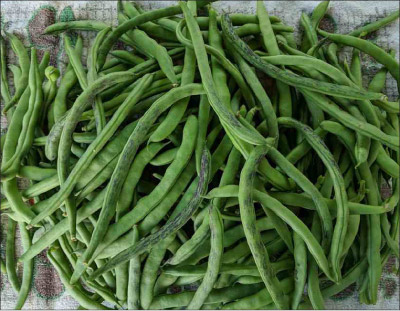Our Language is Nothing to Mess With
Sam Venable
Department of Irony
 My ol’ buddy Wilbur stopped me on the street a few days ago and, knowing I sometimes speak the mother tongue of Southern Appalachia, posed several questions:
My ol’ buddy Wilbur stopped me on the street a few days ago and, knowing I sometimes speak the mother tongue of Southern Appalachia, posed several questions:
“What constitutes a ‘mess’ of anything? How much is a ‘mess’? Is ‘mess’ a noun? A verb? An adjective? Is ‘mess’ something you’d wear to church? Do you make a ‘mess’ if you eat a ‘mess’ sloppily?”
This all started, Wilbur explained, when he purchased a mess of green beans at the farmer’s market. He shared some of his bounty with a neighborhood newcomer from foreign lands (north of Union County), who wanted to know the specifics of the word “mess.” He’d been hearing it spoken in many forms and was confused. The new neighbor went on to say he was so swept up in deep thought about the problem he didn’t watch where he was walking and stepped in fresh dog doo, which messed up his good shoes something awful.
Typically, this is something I wouldn’t mess with.
But the more I thought about it, the more I realized “mess” is one of those Southern Appalachian words that (a) flows off the tongue smooth as honey, (b) covers a wide variety of sins, and (c) defies quantitative analysis.
In other words, “mess” can mean anything you want it to mean.
The “mess” of fish you gave to your cousin can be as few as five small bluegills or an eighteen-foot johnboat filled to the gunnels with four-pound catfish. It all depends on whether he needed enough to feed himself or supply the main ingredient for his Optimist club’s annual cookout.
What’s more, it doesn’t matter if your cousin is rich or poor, Republican or Democrat, completely lucid or nutty as a pecan tree, funny or stoic, friendly or grouchy, etc. Whatever the case, it is permissible to describe him as a “mess.” (Which can be pronounced “MAY-yess” for positive or negative emphasis.)
Additionally, it is OK to decline Cuz’s kind offer to attend his club’s cookout because the doctor said you shouldn’t “mess” with fried foods until a few pounds evaporate from your waist.
Nobody asks for an explanation. Everybody comprehends. Simple as that.
“Mess” shares much in common with “passel,” “tad,” “smidgen,” “right smart of,” “nigh ’bout,” “fair to middlin’” and other inexact—yet perfectly logical and easily understood—figures of Southern Appalachian speech.
Frankly, I wish people in other parts of the country would use words like ours when they speak. Presidential candidates, for instance. I have listened to many presidential debates. The only thing I ever learn is that hot air is a great source of energy.
Both sides sling ridiculous numbers, sizzling accusations, and bold declarations like they’re working the chow line on corned beef hash day. As soon as they hush, fact-checkers swing into action, proving the just-spoken ridiculous numbers, sizzling accusations, and bold declarations have less substance than pocket lint. So why worry about precision?
The first candidate who acknowledges we have a “mess” of debt on our hands, solvable only by a “right smart of changes” in the tax code and an end to a “passel” of wasteful spending gets my vote.
Sam Venable is an author, stand-up comedian, and humor columnist for the Knoxville (TN) News Sentinel.
He may be reached at sam.venable@outlook.com.